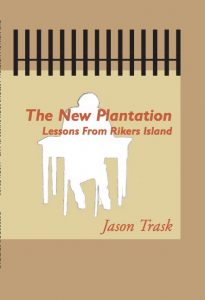 The New Plantation: Lessons from Rikers Island
The New Plantation: Lessons from Rikers Island
A memoir by novelist Jason Trask chronicling his experiences as an English teacher of incarcerated teens in a public high school on Rikers Island. During his three years on the island, over 200 students passed through his classroom, but only five were non-Hispanic whites.
Endorsement
The New Plantation takes us into the chaos of Rikers Island, giving us the vivid voices of young men—kids, really—caught in the unrelenting grip of institutional racism. I found it riveting. —Monica Wood, author of When We Were the Kennedys, Ernie’s Ark, and One-in-a-Million Boy.
From the back cover
The New Plantation: Lessons from Rikers Island chronicles Trask’s quest to cross the cultural divide between his students and him. While he is a white guy from rural Maine—among the whitest states in the nation—nearly all of the young men in his classroom are African Americans or Hispanics from New York City.
We see him break a number of rules, not only those established by the Departments of Correction and Education, but also many of the rules of tradition and, in some cases, common sense. We see him fall on his face time after time, but in the end, though his educational methods seldom meet the standards of orthodoxy, he connects with his students in a meaningful way, and in the process, helps many of them to pass the GED.
During his first day on Rikers Island, as he walks down a long corridor, he passes a group of adult inmates:
“The men look me directly in the eye. I mean directly. They look at me as if they can actually see me. Not the details about me that middle class people use to judge one another—looks, class, intelligence, ethnicity, money, education. There’s none of that. These guys are looking deeper than petty details of that sort. They’re looking at my central nervous system—somehow they’ve hacked their way in and they’re examining it through the lens of a single question: how afraid is this guy?
“It feels to me that they know more about my fears than my mother does. I look back down the corridor, and as I pass the last man in line he yells to me in white-man-ese: ‘Well, golly gee; if it’s not a representative of the Caucasian persuasion coming to watch the neeegroes work the fields.’ Then in his own voice he adds, ‘Welcome to the new plantation, Mister.’ ”